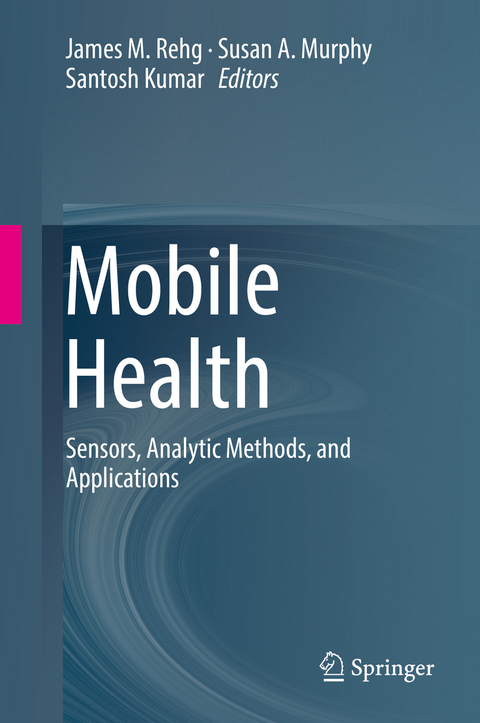
Mobile Health
Springer International Publishing (Verlag)
978-3-319-51393-5 (ISBN)
James M. Rehg is a Professor of Computer Science at the Georgia Institute of Technology where he directs the Center for Behavioral Imaging and co-directs the Computational Perception Lab. Dr. Rehg's research focuses on computer vision, machine learning, and mobile health, with an emphasis on the analysis of video captured by wearable cameras for mobile health applications. He was the lead PI on an NSF Expedition to develop computational methods for measuring, modeling, and analyzing social and communicative behavior, with applications to developmental disorders such as autism. He is currently the Deputy Director of the NIH Center of Excellence on Mobile Sensor Data-to-Knowledge (MD2K), where he leads the Data Science Research Core. Susan Murphy is the H.E. Robbins Distinguished University Professor of Statistics at the University of Michigan. Dr. Murphy's research focuses on improving sequential, individualized, decision making in health, in particular on clinical trial design and data analysis to inform the development of adaptive interventions (e.g. treatment policies). She currently works, as part of the MD2K team and other interdisciplinary teams, to develop clinical trial designs and learning algorithms in mobile health. She is a Fellow of the College on Problems in Drug Dependence, a former editor of the Annals of Statistics, President-Elect of the Bernoulli Society, a member of the US National Academy of Science, a member of the US National Academy of Medicine and a 2013 MacArthur Fellow. Santosh Kumar is a Professor of Computer Science at the University of Memphis where he holds the Lillian & Morrie Moss Chair of Excellence. Dr. Kumar's research focusses on mobile health, with an emphasis on developing computational models to infer human health and behavior such as stress, conversation, smoking, and drug use from wearable sensor data. He is director of the NIH Center of Excellence on Mobile Sensor Data-to-Knowledge (MD2K), that involves over 20 scientists from in computing, engineering, behavioral science, and medicine. He was named one of America's ten most brilliant scientists under the age of 38 by Popular Science in 2010.
Introduction to Section 1: mHealth Applications and Tools.- StudentLife: Using Smartphone to Assess Mental Health and Academic Performance of College Students.- Circadian Computing: Sensing, Modeling, and Maintaining Biological Rhythms.- Design Lessons from a Micro-Randomized Pilot Study in Mobile Health.- The Use of Asset-Based Community Development in a Research Project Aimed at Developing mHealth Technologies for Older Adults.- Designing Mobile Health Technologies for Self-Monitoring: The Bit Counter as a Case Study.- mDebugger: Assessing and Diagnosing the Fidelity and Yield of Mobile Sensor Data.- Introduction to Section II: Sensors to mHealth Markers.- Challenges and Opportunities in Automated Detection of Eating Activity.- Detecting Eating and Smoking Behavior Using Smartwatches.- Wearable Motion Sensing Devices and Algorithms for Precise Healthcare Diagnostics and Guidance.- Paralinguistic Analysis of Children's Speech in Natural Environments.- Pulmonary Monitoring Using Smartphones.- Wearable Sensing of Left Ventricular Function.- A new direction for Biosensing: RF sensors for monitoring cardio-pulmonary function.- Wearable Optical Sensors.- Introduction to Section III: Markers to mHealth Predictors.- Exploratory Visual Analytics of Mobile Health Data: Sensemaking Challenges and Opportunities.- Learning Continuous-Time Hidden Markov Models for Event Data.- Time-series Feature Learning with Applications to Healthcare Domain.- From Markers to Interventions: The Case of Just-in-Time Stress Intervention.- Introduction to Section IV: Predictors to mHealth Interventions.- Modeling Opportunities in mHealth Cyber-Physical Systems.- Control Systems Engineering for Optimizing Behavioral mHealth Interventions.- From Ads to Interventions: Contextual Bandits in Mobile Health.- Towards Health Recommendation Systems: An Approach for Providing Automated Personalized Health Feedback from Mobile Data.
| Erscheinungsdatum | 12.08.2017 |
|---|---|
| Zusatzinfo | XL, 542 p. 128 illus., 100 illus. in color. |
| Verlagsort | Cham |
| Sprache | englisch |
| Maße | 155 x 235 mm |
| Themenwelt | Mathematik / Informatik ► Informatik |
| Medizin / Pharmazie | |
| Technik | |
| Schlagworte | Artificial Intelligence • artificial intelligence (incl. robotics) • Behavioral Medicine • chronic diseases and conditions • Computer Communication Networks • Computer Science • Control Systems Engineering • Data Mining • data mining and knowledge discovery • Epidemiology and medical statistics • Expert systems / knowledge-based systems • fitness trackers • health and safety aspects of IT • health data analytics • Health Informatics • health interventions • Information technology: general issues • just-in-time adaptive interventions • low-power sensing and computing • machine learning • Medical equipment and techniques • Mental Health • mhealth • mobile computing • Mobile Health • network hardware • probability and statistics • Reinforcement Learning • Robotics • Statistics for Life Sciences, Medicine, Health Sci • Wearable sensors |
| ISBN-10 | 3-319-51393-1 / 3319513931 |
| ISBN-13 | 978-3-319-51393-5 / 9783319513935 |
| Zustand | Neuware |
| Haben Sie eine Frage zum Produkt? |
aus dem Bereich


